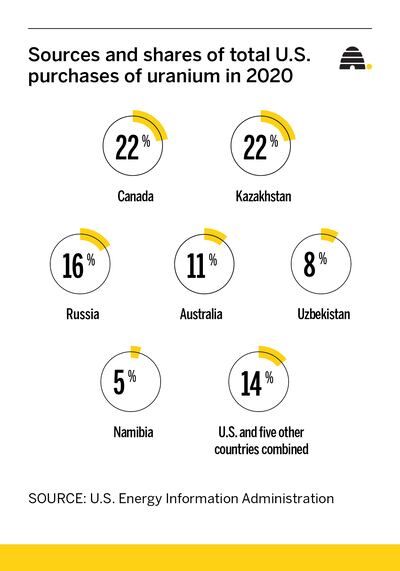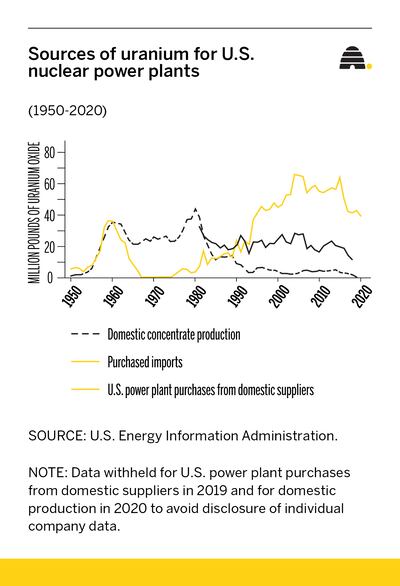A Ukrainian energy coalition made up of seven organizations and a municipality in the war-torn country sent a direct appeal to President Joe Biden to cease importing Russian uranium.
In a letter from the Energy Transition Coalition directed to Biden, his secretary of state, secretary of energy and the chairman of the Nuclear Regulatory Commission, the coalition said the United States and other countries need to follow up the crude oil ban with a prohibition on the nuclear fuel sector.
“It is crystal clear that Russia is using its nuclear company as one of the tools in the ongoing war,” the letter reads. “At this very moment it is important to impose tough sanctions against Russia, which will halt its ability to continue waging a brutal war in Ukraine and threaten international security.”
The U.S. gets 16% of its uranium from Russia to help fuel the country’s 94 reactors at 56 power plants located in 28 states.

“My main message is that Ukraine needs one, the most swift, ASAP devastating economic sanctions on Russia, especially focused on its energy sector. Two, to continue providing military support so that we can win this war,” Kostiantyn Krynytskyi, head of the energy department at Ekodia told the Deseret News. Ekodia is a Ukrainian-based member of the coalition.
Krynytskyi said the coalition has advocated for a gradual phase-out of Ukrainian power plants and has a goal of the country being 100% renewable by 2050.
He added that Russia has now “weaponized” Ukraine’s own power plants against its residents, and the United States and European Union should no longer finance the Russian state nuclear giant, Rosatom.
“So we stress that in all the discussions around the ban on Russian fossils not to forget nuclear as it also finances the war,” he said. The Russian military has control of two of Ukraine’s nuclear power plants.
The coalition’s letter dated Tuesday points out the company has a portfolio of overseas orders worth $133 billion and is active in nuclear power plant projects in multiple countries that include Hungary, Egypt, China, Iran and Turkey. The letter says the European Union gets 20% of its uranium from Russia.
On Thursday, Wyoming GOP Sen. John Barrasso, ranking member of the Senate Energy and Natural Resources Committee, was joined by three other Republican senators in introducing legislation to ban Russian uranium imports to the U.S.
“The time is now to permanently remove all Russian energy from the American marketplace,” Barrasso said.
“We know Vladimir Putin uses this money to help fund his brutal and unprovoked war in Ukraine. While banning imports of Russian oil, gas and coal is an important step, it cannot be the last. Banning Russian uranium imports will further defund Russia’s war machine, help revive American uranium production, and increase our national security,” the senator said.
Wyoming, Utah and other states in the West are home to uranium deposits and would benefit from more domestic mining. Data from the U.S. Energy Information Administration show domestic sources of uranium to fuel power plants have sharply declined over the last several decades and an increasing reliance on foreign countries.
“Uranium is an important energy source and yet another example of how the U.S. needs to shore up our critical supply chains. Unfortunately, rather than producing and reestablishing our domestic uranium enrichment capacity, we have relegated our leadership and the revenue profits to Russia and its allies,” said Sen. Kevin Cramer, R-N.D., one of the other senators involved in introducing the legislation.
“Our bill is an impetus to change by banning the import of uranium from Russia and cutting off another avenue which funds Putin’s unwarranted and unprovoked violent war on Ukraine.”
Sen. Roger Marshall, R-Kansas, said imports from Russia and its allies such as Kazakhstan and Uzbekistan, account for nearly half of the uranium used to power U.S. nuclear plants.
“This high level of dependence on foreign uranium was threatening our national interest and national security before Russia invaded Ukraine, now it’s simply unacceptable,” he said.
Data shows the United States gets 22% of its uranium from Kazakhstan and 8% from Uzbekistan.
Overall, owners and operators purchased about 49 million pounds of Uranium in 2020.

Nima Ashkeboussi, senior director of fuel and radiation safety at the Nuclear Energy Institute, said such a prohibition on Russian uranium would not have an immediate impact on U.S. power supplies.
“While Russia is a global supplier of commercial conversion and enrichment, U.S. utilities contract with a worldwide network of companies and countries for their fuel requirements to mitigate the risks of potential disruption. Should such imports be disrupted, U.S. utilities would not immediately be impacted because of long-term planning by operators, which includes inventories and contractual flexibilities to obtain additional supply,” Ashkeboussi said.
Russia also supplies a fuel called high-assay, low-enriched uranium which is enriched by up to 20% and high on the U.S. Department of Energy’s priority list to ensure its availability domestically because it could be used in advanced nuclear plants expected to be developed this decade or next.
According to an article in World Nuclear News, most of the advanced reactors under development will use this specialized fuel to achieve smaller designs, longer operating cycles, and better efficiencies than previous reactor designs.
The energy department projects that more than 40 tons of the fuel will be needed by 2030.
“NEI continues to support the development of a domestic fuel supply chain, including continued funding for the domestic uranium reserve, new low-enrichment capabilities to resupply the nation’s stockpile of nuclear fuel in the American Assured Fuel Supply Reserve, and the creation of U.S. enrichment capabilities for high-assay low-enriched uranium needed for advanced nuclear technologies that will play a critical role meeting our national climate goals,” Ashkeboussi said.
The coalition seeking the uranium ban is made up of “Ekodia” Ecoaction, Ekoltava, Ecoclub, City of Sun, Khmelnytskyi Energy Cluster, All-Ukrainian Sustainable Development & Investment Agency, PravoPolice and the municipality of Mykolaiv.
Sen. Cynthia Lummis, R-Wyo., is backing the legislation to ban imports of Russian uranium.


